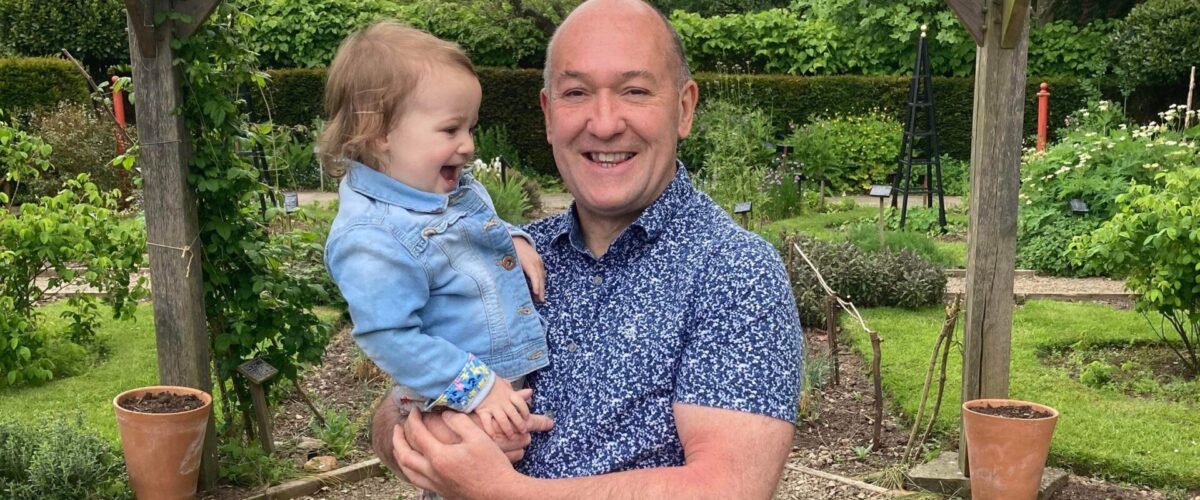News Hub
Air ambulance patient reflects on his cardiac arrest this Restart a Heart Day

Former air ambulance patient, Sean Ottey, is raising the awareness of the importance of early and quick medical interventions this Restart a Heart Day (16 October) after suffering a cardiac arrest in August 2020.
As a medical professional, Coalville GP Sean Ottey (56) knows exactly what difference early interventions and being flown to hospital by the local air ambulance made to his recovery after he suffered a cardiac arrest whilst exercising.
“It’s all down to time. Getting the right treatment as quickly as possible is absolutely crucial in terms of minimising damage to the heart muscle, memory and brain,” he explains.
On 29 August 2020, Sean was flown to Derby Royal Infirmary in just 12 minutes by Warwickshire & Northamptonshire Air Ambulance (WNAA) after the helicopter was called out to Hood Park Leisure Centre in Ashby-de-la-Zouch – where Sean was taking part in a high intensity training session.
“The air ambulance critical care doctor gave me drugs which helped my condition and the speedy transfer to hospital was crucial in the chain of events that saved my life,” he says.
Sean “felt absolutely fine” on the morning in August this year when he was taking part in the weekly class, he has attended at the local leisure centre for the past 15 years.
“I remember doing a backward lunge and the next thing I was waking up in intensive care,” he says.
There is a history of heart problems in Sean’s family and despite him being a non-smoker and exercising regularly he believes “it is inevitable that I would have had a cardiac arrest at some point.”
Looking back now he says that he “was in the right place at the right time” when it happened as the leisure centre staff were First Aid trained and did CPR on him straight way.
“If I had a cardiac arrest when I was out walking on my own in the middle of nowhere the outcome would have been completely different,” he says.
Sean spent over two weeks in hospital – 48 hours in an induced coma – and during that time he had an implantable cardioverter defibrillator (ICD) and stent fitted.
Since his incident, life has been hectic for Sean. Unfortunately, he was held back a little while awaiting a VT (Ventricular tachycardia) ablation operation as his heart continued to be problematic after the cardiac arrest, but he has managed to return to work full-time after a few months.
“I managed to get my driver’s licence back just over six months ago which has been liberating but more importantly, I moved house and moved in with my partner, and we had a little baby girl called Sapphire,” says Sean.
“I have also managed to return to some of the exercises I was doing before my cardiac arrest and I have been skiing once again – I am a qualified skiing instructor and it was a real passion that I had,” he adds.
Members of the exercise class he was attending at the time of his cardiac arrest have raised funds for Warwickshire & Northamptonshire Air Ambulance and Sean is encouraging others to support the charity.
“Once again, I can only thank WNAA so much for their care and the opportunity they gave me to continue to enjoy life and more importantly create a new little life in the process.
“I also hope my story inspires anybody who doesn’t know how to do CPR to find out. I am living proof that lives can helped to be saved by CPR,” he adds.
WNAA Doctor and Clinical Lead, Matthew Wyse explains:
“The best chance of survival for a cardiac arrest recognises there is a chain of survival that involves dialling 999 for help, good CPR, using a defibrillator to shock the heart and excellent critical care to support the patient until they recover.
“The team from WNAA have a role to play at every step in the chain of survival but especially in providing exceptional critical care at the scene of an incident and quick transfer to hospital – just like we did for Sean.”
It is estimated that more than 30,000 out-of-hospital cardiac arrests happen every year in the UK, and less than one in 10 people survive. Early CPR and defibrillation can more than double the chances of survival in some cases.
Restart a Heart Day – led by the Resuscitation Council UK – is highlighting the importance of everyone learning CPR and actively promoting the use of public access defibrillators, to greatly increase the chances of survival following a cardiac arrest.

